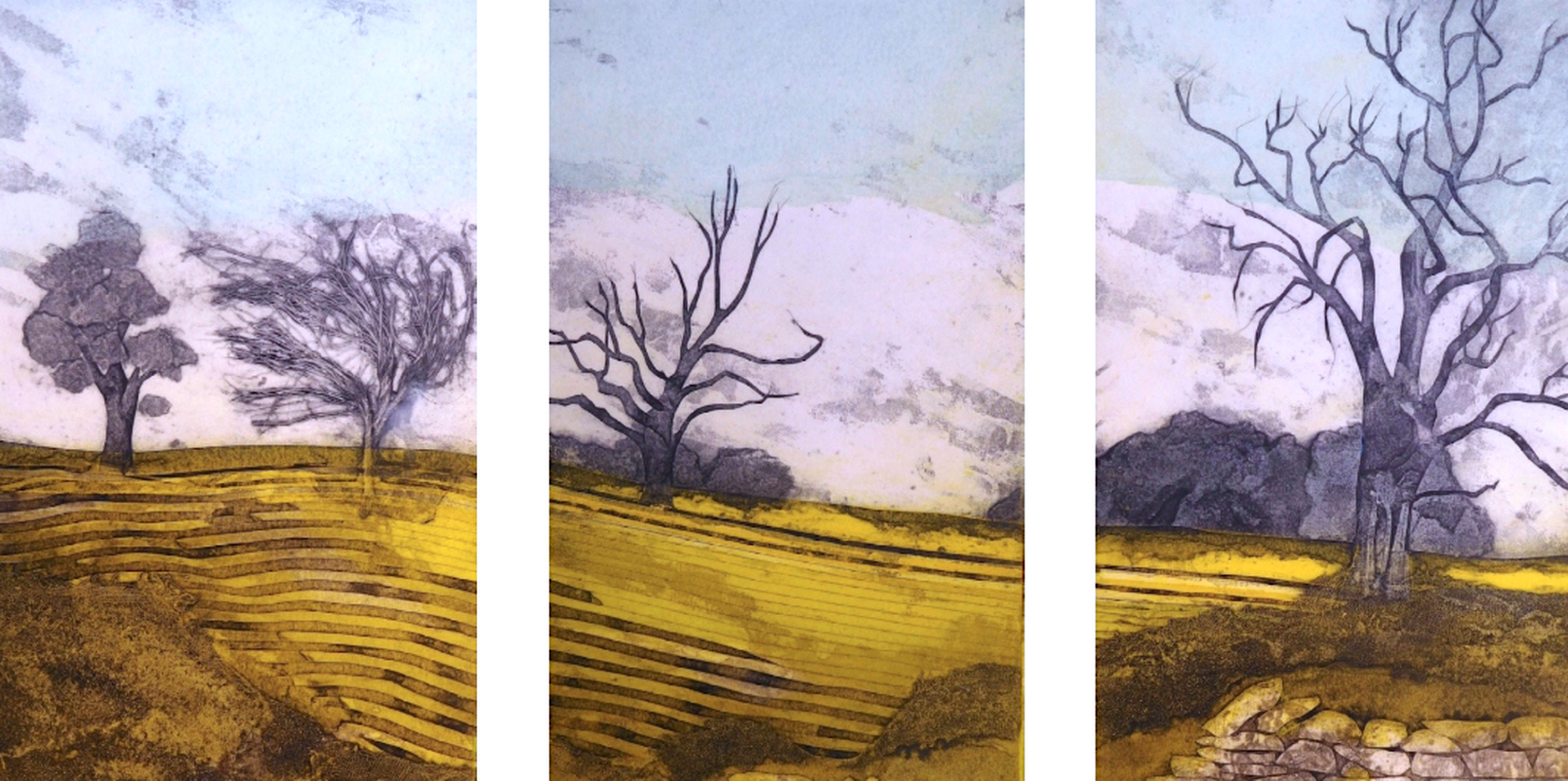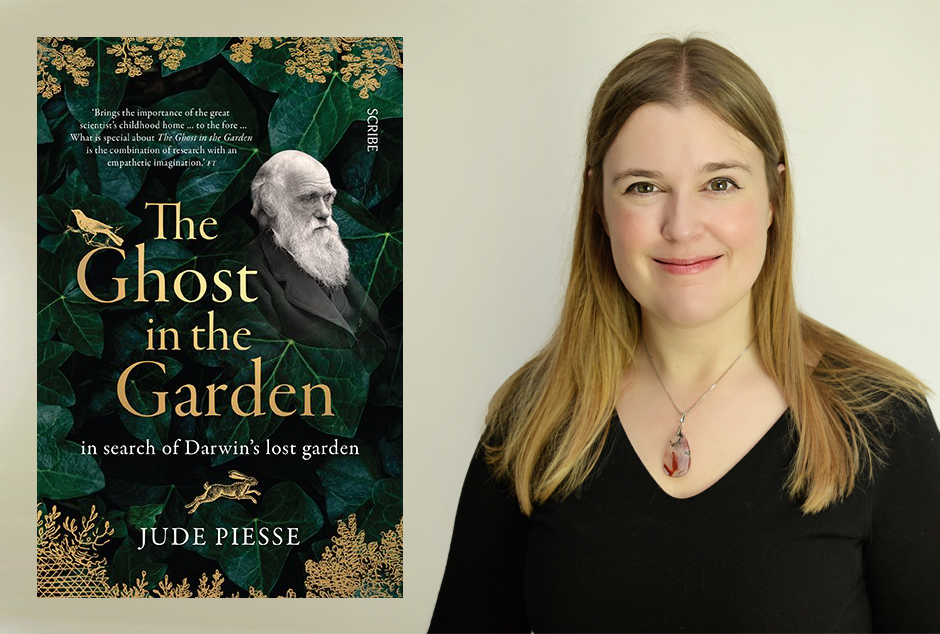
SARAH ROSS-THOMPSON AND THE ART OF COLLAGRAPHED PRINTS
I interviewed artist Sarah Ross-Thompson whose exceptional Collagraphed prints use fabrics, lichen, porridge and string to create images of the dramatic Scottish Highlands where she


I interviewed Jude Piesse, about her new book, The Ghost in the Garden, that blends biography, memoir, and nature writing to tell the story of Darwin‘s lost childhood garden. Jude lectures on literature at Liverpool John Moores University and holds MAs in English Literature and in Creative Writing from King’s College London and the University of East Anglia.
Leslie: Please give us a brief overview of your book The Ghost in the Garden.
Jude: The Ghost in the Garden tells the story of Darwin’s childhood garden at The Mount in Shrewsbury. It reveals how the garden shaped Darwin’s life and work, but also brings together the narratives of lesser-known people connected to the site, including Darwin’s mother, four sisters, and the family’s gardeners. The book includes a memoir strand, based on my experiences of raising a young family close to the remaining fragments of the site. Formally, the book is quite hybrid and sometimes experimental – combining biography, garden history, and the history of science with personal and creative elements.
Leslie: How did you come across Darwin’s ‘secret garden’? In what ways was it significant to him and you?
Jude: The surviving kitchen garden walls were directly opposite the house I used to rent in Shrewsbury – I could see them from my front window and became slightly obsessed! From talking to neighbours and people involved with restoration efforts, I came to learn more about the seven-acre site that used to exist quite literally on my doorstep. I became pregnant with my second baby at the point I was discovering the garden, and after her birth I often took short riverside walks, with my daughter in a sling, past the two steep acres of the garden bank now owned by Shropshire Wildlife Trust. For me, Darwin’s Garden became a springboard for exploring how we are all shaped by particular places, family ties, and our earliest connections with the natural world.
The garden was significant to Darwin as a child because it is where he spent most of his time playing, learning about the natural world, and establishing naturalist’s habits like collecting stones and insects. It continued to be important to him as an adult, as he returned to The Mount to carry out experiments and to complete some significant evolutionary writings in the early 1840s. He wrote about the garden fondly in his autobiographical works of 1838 and 1876.

Leslie: ‘Survival of the fittest’ is often misunderstood. What does that phrase really mean?
Jude: I have learnt that there are many different ways of reading evolutionary theory and attributing value to it. For me, the idea of ‘fitness’ in this context is less to do with brute strength, though this comes into it, than with how nature favours species and individuals that display the most flexibility, adaptability, and diversity of form. But as I argue in my book, I think that notions of the ‘survival of the fittest’ at their most reductive have often upstaged Darwin’s subtler ideas about the webs of mutual relation that exist between all species, and between species and their environment. That’s a shame, as it’s resulted in a lost opportunity to connect with the deep ecological vision that is one of On the Origin’s most exciting and important revelations.
Leslie: In what ways was Charles Darwin a very unlikely explorer? What drove him and made him such a great naturalist?
Jude: Darwin was definitely an unlikely explorer in some respects. He didn’t much enjoy school or university, wasn’t especially driven as a young man, and was the product of a very provincial, localised upbringing in Shrewsbury. But in other ways, he was also quite a likely explorer. Many people linked to Darwin’s exceptionally well-connected family were involved with overseas travel and the development of related sciences, such as botany.
I think Darwin became a great naturalist partly because he was enabled by these networks and circumstances. His Beagle voyage famously supplied him with the greatest chance of his life, and he was also able to develop naturalist’s habits and a lifelong love of nature by roaming the garden at home. I also think that Darwin was unusually intelligent, curious, patient, and attentive, and that he was an excellent communicator of his ideas in writing. For instance, as I explore in my book, he uses a wonderful range of metaphors to convey ideas about relationships within systems, from figures of webs and trees through to the domestic scale of the garden.
Leslie: How did you research your book? What were the most interesting and surprising things you found out? Tell us about the characters who feature and how you brought them in.

Jude: Much of the research I did for my book was conventionally scholarly. For instance, I did original archival research at Cambridge University, Shropshire Archives, Bristol Archives, and the Wedgwood Museum. I made use of lots of original letters, many of which have been digitized as part of the open access Darwin Correspondence Project. I read widely across a range of disciplines and made full use of Darwin’s own extensive writings. I love doing this kind of research and found out all sorts of things I wasn’t expecting – from Darwin portraitist Ellen Sharples’s diary accounts of rambles in the countryside with her own young daughter, Rolinda, to evidence of gardener John Abberley’s knowledge of beekeeping. I enjoyed weaving these serendipitous findings into the textures and arguments of my chapters.
I also used fictional and poetic techniques to bring the people I researched to life. Some of the main ‘characters’ in the book include Darwin’s mother Susannah, who died when Darwin was only eight years-old, but who we know was a keen gardener, involved in breeding doves at The Mount; and Darwin’s four outspoken sisters, who exchanged correspondence with their famous brother when he was on the Beagle.
Leslie: As the Earth experiences climate/eco breakdown, what does Darwin’s life, character and evolutionary theory have to say to us? Does it in any way predict or offer a way out of the self-destructive path we have entered upon?
Jude: I think that Darwin’s ways of understanding the natural world provide very useful models for us today in this respect. Darwin was highly alert to the ways in which everything connects with everything else – individuals, species, habitats, weather systems. He understood, and brilliantly illustrated, how tiny changes can have big impacts; how the very small and the very large interconnect in ways that are both mysterious and, at least in theory, entirely explicable. But I also find hope in Darwin’s recognition of the fact that future outcomes are never entirely fixed or predictable. I address what we might be able to learn from Darwin’s evolutionary theory, ecological vision, and measured response to the existential crisis his own ideas brought about more fully in the last chapter of my book, ‘The Hare and the Marble.’
On a simpler level, there’s also a lot to be gained from imaginatively connecting with the boy Darwin, who loved to collect, explore, and play in the garden back home. It was Ellen Sharples’s portrait of Darwin as a child gardener that first captured my imagination when I was starting to research the book, and which held it to a much greater extent than the bearded father of evolution depicted in later images. Since writing The Ghost in the Garden, I’ve definitely become more conscious of the need to connect my own children with nature through our allotment and Liverpool’s many parks. It’s not much to weigh against environmental collapse, but we all have to hope that fostering attitudes of care and responsibility for the natural world might count for something.
ABOUT LESLIE TATE’S BOOKS:

I interviewed artist Sarah Ross-Thompson whose exceptional Collagraphed prints use fabrics, lichen, porridge and string to create images of the dramatic Scottish Highlands where she

Part 2 of my interview with Mark Statman looks closely at Mark’s Latin American poetic influences, his life in Mexico and ends with an extract

I interviewed international poet and translator Mark Statman about Volverse/Volver, his 14th published collection. Mark, who has won national arts awards, is Emeritus Professor of Literary

I interviewed Lisa Dart, finalist in the Grolier, Aesthetica and Troubadour Poetry Prizes and author of The Linguistics of Light (poems, Salt, 2008), Fathom (prose

I interviewed writer Julia Lee Barclay-Morton about her experience of autism. Julia began as an experimental dramatist in New York, moving to the UK to
| Cookie | Duration | Description |
|---|---|---|
| cookielawinfo-checkbox-analytics | 11 months | This cookie is set by GDPR Cookie Consent plugin. The cookie is used to store the user consent for the cookies in the category "Analytics". |
| cookielawinfo-checkbox-functional | 11 months | The cookie is set by GDPR cookie consent to record the user consent for the cookies in the category "Functional". |
| cookielawinfo-checkbox-necessary | 11 months | This cookie is set by GDPR Cookie Consent plugin. The cookies is used to store the user consent for the cookies in the category "Necessary". |
| cookielawinfo-checkbox-others | 11 months | This cookie is set by GDPR Cookie Consent plugin. The cookie is used to store the user consent for the cookies in the category "Other. |
| cookielawinfo-checkbox-performance | 11 months | This cookie is set by GDPR Cookie Consent plugin. The cookie is used to store the user consent for the cookies in the category "Performance". |
| viewed_cookie_policy | 11 months | The cookie is set by the GDPR Cookie Consent plugin and is used to store whether or not user has consented to the use of cookies. It does not store any personal data. |